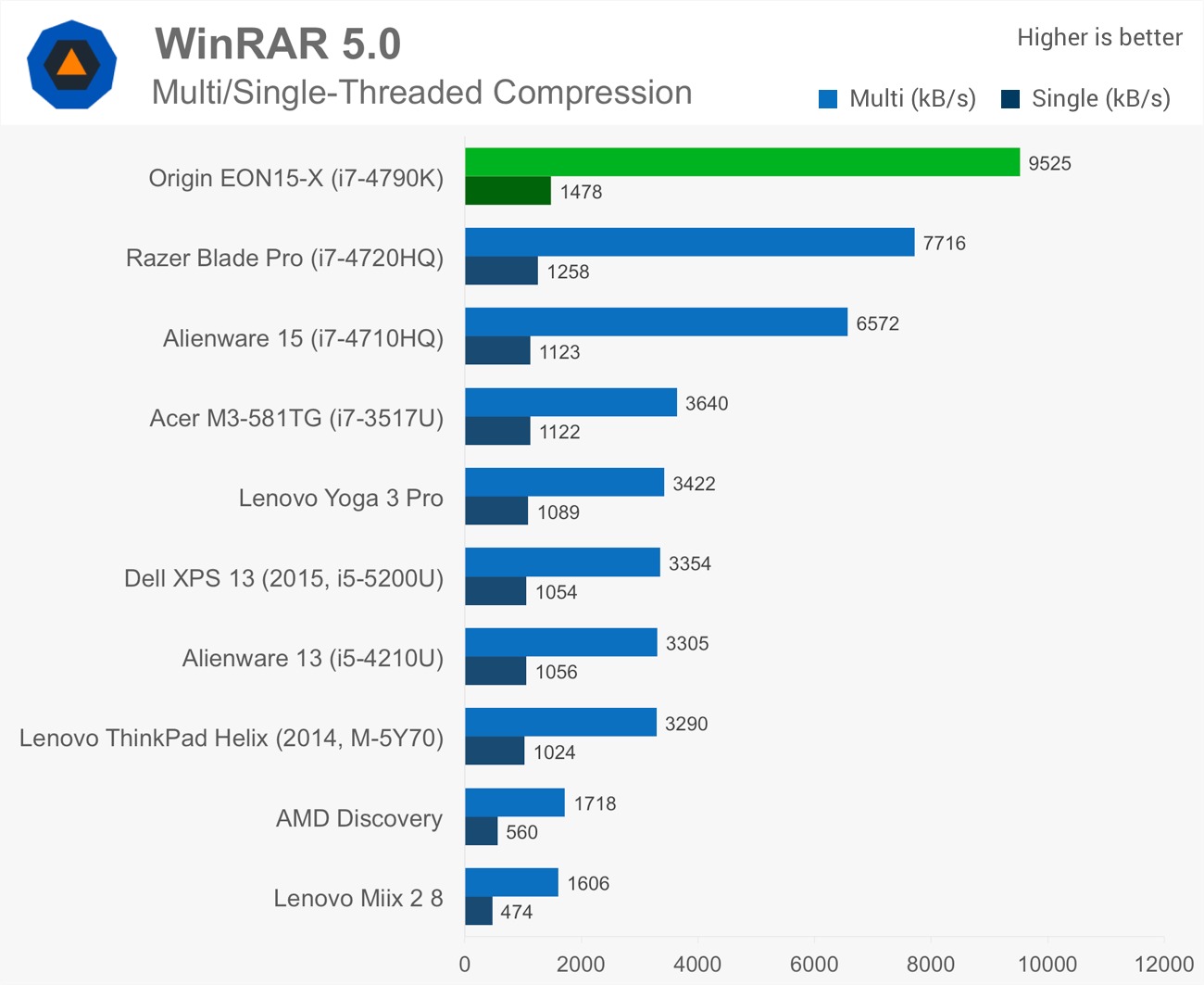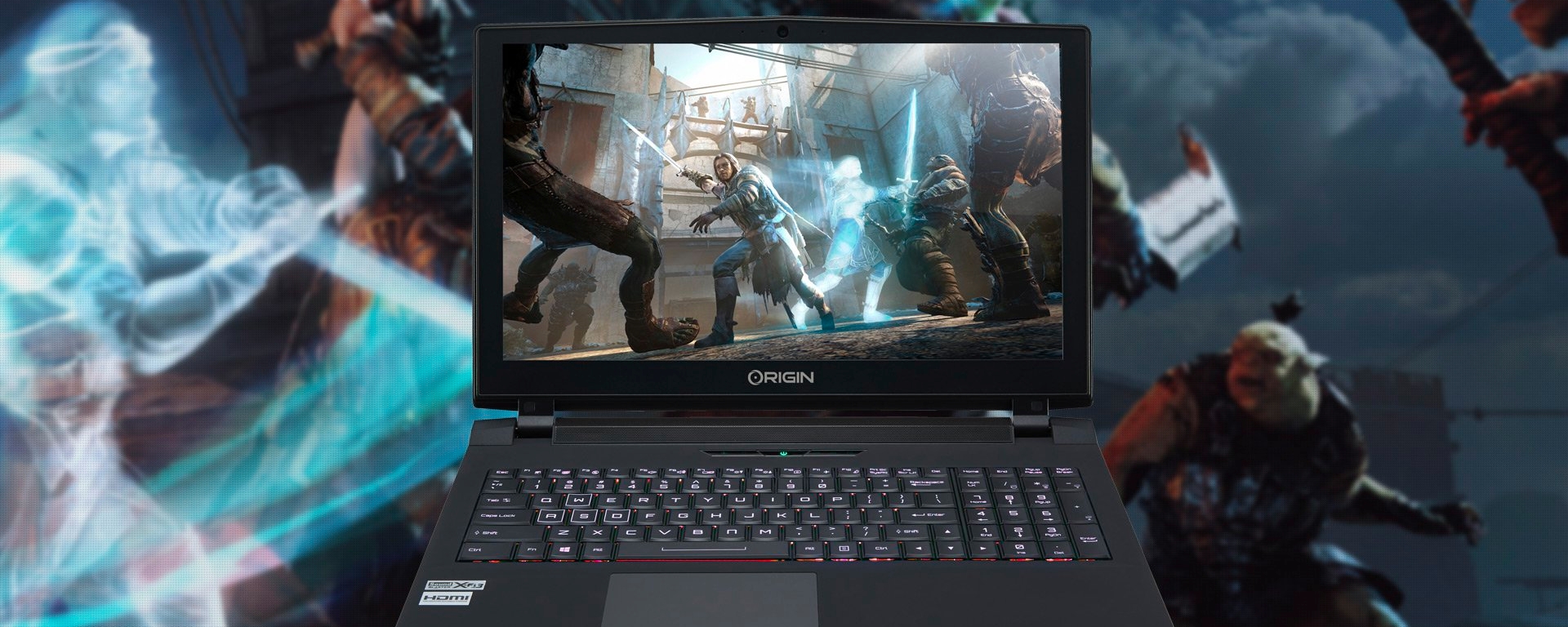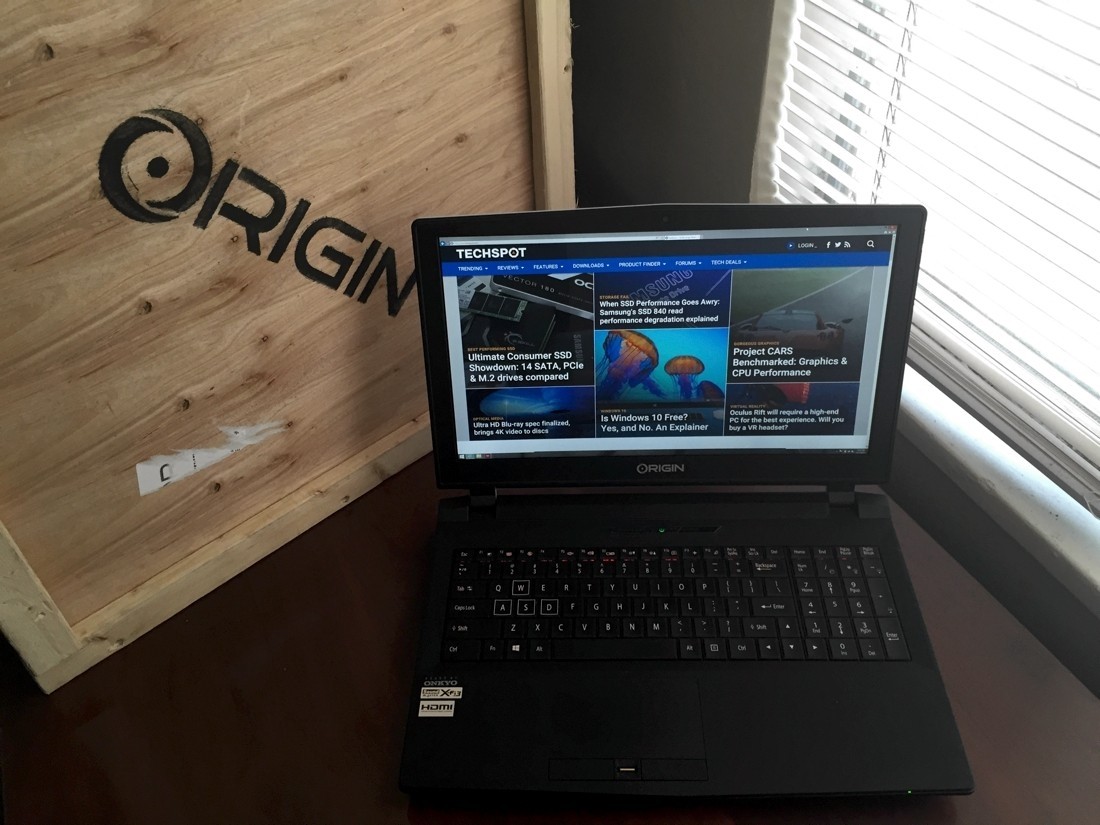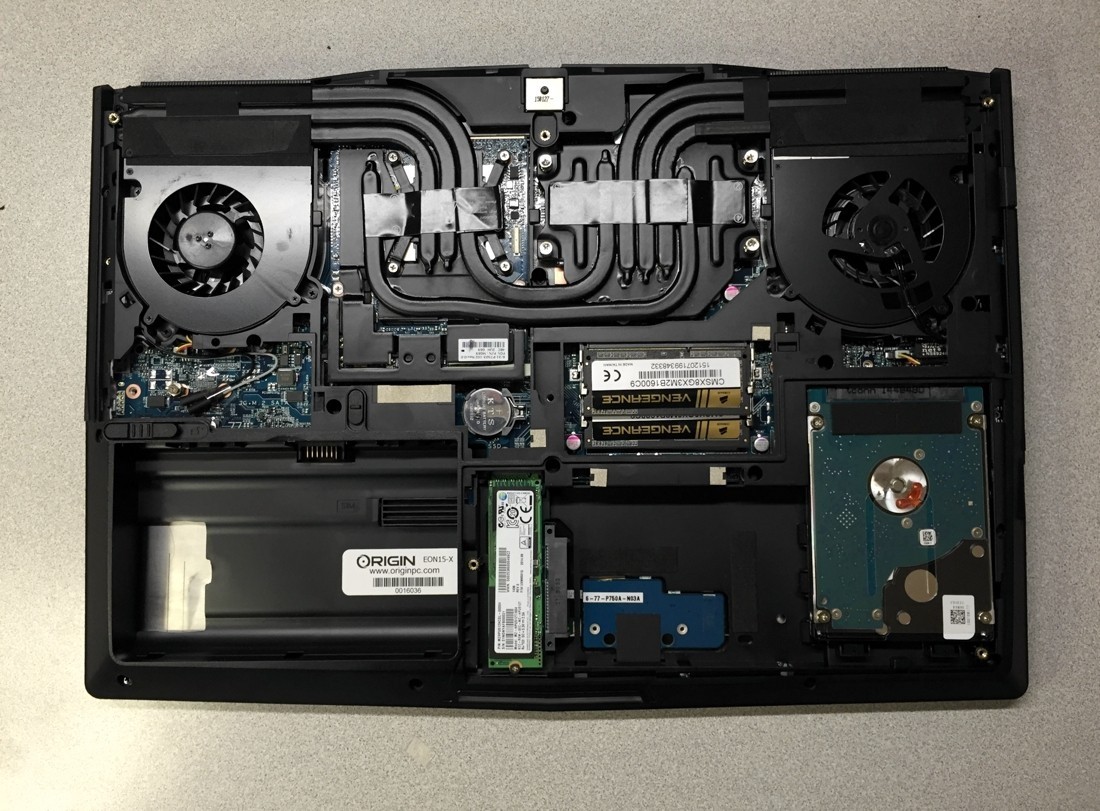Ultrabooks, shmultrabooks. Mobile or otherwise, gamers know there is no substitute for a massive slab of expensive and power-hungry hardware. Sure, the dividing line between laptop and desktop performance is thinning, but the singularity at which both converge remains to be seen.
As a result, Origin PC has implemented a straightforward tactic to grant laptops hairier chests: cram in an honest to goodness desktop CPU. Yep, Origin's EON15-X packs a full-fledged "Devil's Canyon" Intel Core i7 into a (relatively) modest 15-inch laptop. We'll talk details in just a moment, but know this: relative to its peers, the EON15-X's performance is impressive.
The highest end configurations, like the one we received, pair an i7-4790K with a single GeForce 980M and a 4K UHD (3840 x 2160) display. Other options include up to 32GB RAM, 2 x M.2 SSDs and 2 x 2.5-inch SSD or HDDs. The EON X comes in both 15-inch and 17-inch flavors. It should be said both models appear almost identical in terms of features, performance specs and upgrade options; however, the 17-X is a full pound heavier. The only reason you'll want to spring for the 17-inch model is for a more expansive screen, but you'll need to make do with 1080p.
If stuffing desktop-grade silicon into a laptop blows your mind, let it be said Origin isn't the only company to achieve this feat. For starters, Clevo/Sager and MSI come to mind. In fact, Origin works with Clevo to design many of its laptops, the EON15-X included. But hybrids like these are rare animals in the notebook kingdom, surviving in a niche ignored by the largest laptop makers. Additionally, finding one as "portable" as the EON15-X makes this laptop all the more unusual.
First impressions
The crate. I loved the wooden crate. It's an additional $4 and totally worth it for the novelty, if not for the protection. The UPS driver who delivered the laptop actually told me, "I've delivered packages for seven years... first time I've delivered something like this". This is a great first-impression before we even open the box.
In the box, I received everything you may expect plus some extras: an EON15-X laptop (of course), a rather sizeable 230-watt power brick, a black neoprene sleeve case, a poster, a t-shirt, reinstallation media and a manual.
Design and Build Quality
Origin states its EON15-X is the thinnest and lightest notebook of its kind to feature an overclocked 4th gen Intel Core i7 desktop CPU. Neither "thin" nor "light" are words you're likely to associate with the EON15-X, but its size and weight are entirely genre-appropriate. Our config weighed in at 7.4 pounds with an average thickness of about 1.5-inches. By comparison, Origin's previous and current gen EON15-S (mobile CPUs) weigh 6.8 and 5.5 pounds, respectively.
Overall, EON15-X exhibits a simple, solid and thoughtful design. Build quality is very good. We have a lot of plastic here, but the body and mechanical aspects (e.g. display hinges, buttons, switches) feel solid. The display lid is thin and exhibits some flex, but doesn't feel perilous or cheap. The base is rock solid with big, non-slip pads on the bottom.
The palm rest features a soft matte finish which mitigates fingerprints while offering a velvety feel. Any edges and corners that are in contact with your hands and wrists are soft and/or rounded. There are also no shortage of ports and they are placed intelligently with the power and video in the back, USB on both sides and not too close together.
The "gamer" aesthetic of the EON15-X is largely subdued. Origin opted for a small logo, clean lines and broad unadorned surfaces. There aren't any giant, lit-up alien faces or garish decals. Instead, the true purpose of this laptop is betrayed mostly by its size, angles, custom lighting and modestly stylized rear vents. It's not over the top, just a straightforward gaming laptop.
Hardware Overview and CPU Performance
Origin EON15-X
Starts at $1,665, $3,300 as tested
- 15.6-inch 4K QFHD (3840 x 2160) Glossy Display
- Intel Core i7-4790K @ 4.5GHz (overclocked)
- 16GB (8GB x 2) Corsair Vengeance 1600MHz DDR3
- Nvidia GeForce GTX 980M (8GB)
- 480GB M.2. PCIe SSD + 1TB Seagate SSHD SATA
- Full size keyboard w/ customizable backlight
- 4 x USB 3.0 (1 x powered, 1 x eSATA combo)
- 2 x DisplayPort 1.2, 1 x HDMI-out (with HDCP)
- Headphone, Mic, S/PDIF out, Line in, RJ-45 LAN port
- 802.11a/b/g/n/ac + Bluetooth 4.0
- 6-in-1 Card reader
- Fingerprint / Biometric reader
- Windows 8.1 64-bit
- Removable 8 cell Lithium-lon battery pack, 82WH
- 7.4 lbs, (W) 15.2" x (H) 1.40" x (D) 10.31"
Origin's review unit shipped with 4th-gen Intel Core i7-4790K. Origin also overclocked the thing to 4.5GHz for us, which is a 500MHz bump over its stock clock of 4000MHz. When paired with a GeForce GTX 980M, this is very likely the fastest laptop you've seen. I know it's the fastest laptop WE have seen (spoiler alert!). In fact, the EON15-X would give a lot of sub-$2000 gaming rigs a run for their money.
Our config boasts the fastest CPU and GPU offered, 16GB RAM, 4K display panel, 1TB SSHD and a 480GB PCIe SSD. With all the extras included, our config runs an eye-popping $3,300 plus tax.
For a little more context, the base config (i5-4460S, GTX 965M, 8GB RAM, 120GB SSD) is $1,665, while one attuned to my own tastes (i7-4690K, 980M, 16GB RAM, 480GB SSD) runs about $2,500.
It's safe to say the inclusion of a high-end desktop CPU is the defining property of the EON15-X. You may notice this is an Intel "K" and not the hexacore "X" (think of the power brick!).
Even amongst similarly named models, the desktop vs. mobile performance gap can be significant as desktop processors are invariably faster. Another thing is the cost of mobile processors. If you want to match the performance of something like an i7-4790K using a mobile chip, you'd be looking at something like the i7-4940MX which is about four times as expensive. Yikes.
Even our recently reviewed Alienware 15 with its i7-4710HQ (mobile model) can't keep pace with the EON15-X's i7-4790K (desktop model). Cinebench and x264 encoding benchmarks both illustrate an across-the-board advantage of about 20-25 percent.



Considering the variables here (i.e. +500MHz overclock, Intel Core i7-4790K, laptop form factor, GTX 980M), I fully expected CPU throttling to be an issue. When a processor gets too hot (~100°C in this case), it will down-clock to lower frequencies to maintain safe operation. It pleases me to report that the EON15-X showed no signs of throttling while gaming.





For the most part, CPU temps hovered between 80 to 90° Celsius while shooting things. Intel's thermal interface material improvements on its Devil's Canyon chips should be helping a bit here. Where throttling did become an issue though were our synthetic benchmarks.
During the most rigorous multi-threaded CPU tests, the system lowered gears from 4500MHz to to as "low" as 4290MHz. Mind you, this is still higher than the i7-4790K's actual default clock of 4000MHz, so it is hard to complain. Even so, this drop in performance is also reflected in our benchmark results.
Upgradability
In terms of upgradability, Origin has made it as easy as it gets for this form factor. Two screws, a quick push of the bottom panel outward and presto – you now have access to every user upgradeable part. Yes, the processor actually sits in a real LGA1150 desktop socket which makes replacements/upgrades conceivable.
Also, the GPU is seated in an industry-standard MXM slot making graphics upgrades technically feasible as well. Both chips are smothered underneath a unified cooling system which is fully removable without diving down the rabbit hole of laptop base disassembly. Honestly, the EON15-X looks easier to upgrade than some desktops, so any challenges you'll face will probably be sourcing parts and ensuring compatibility.
Sound
The "Onkyo" sticker hints that Origin takes your audio seriously. Onkyo is a well-known sound company typically associated with audio receivers and home theater equipment. The speakers are contained within a sound bar located just underneath the display which points directly toward your ear holes. The resulting sound is crisp and loud, but ultimately light on bass. With the included optical SPDIF and Sound Blaster XFI EQ controls though, rest assured that you can squeeze some decent sound into your choice of headphones or external speakers.
Display, Keyboard and Trackpad
With a glossy 4K UHD (3840 x 2160) display, the 15-inch EON-X boasts a pixel density of 283 PPI, a figure once reserved for high-end smartphones and tablets. Consequently, the resulting image is impressively sharp and detailed. Inside our review unit was a Samsung LTN156FL02 display. For the record, this is a TN panel, but ostensibly a high quality one. The same panel also appears in some of Lenovo's 4K-equipped gaming laptops such as the Y50.
The factory specs are: 270 nits (brightness), 700:1 contrast ratio and a 72% color gamut. Subjectively, blacks and contrast were good, colors were vibrant and viewing angles were decent, especially for TN. However, multimedia professionals may not find the EON15-X's color accuracy and viewing angles up to par with their specific needs.
If there are any complaints about the screen here, it's (literally) nit-picking: Windows DPI scaling and very possibly screen brightness.
On the first point, Windows' DPI scaling implementation has vastly improved since Windows 8.1 but remains imperfect. There's always "that program" which doesn't work well, doesn't work at all or simply ignores the Windows DPI scaler. It's an irritation that hopefully improves by the time Windows 10 is released, but for now, this is simply the burden of being a 4K/UHD early adopter.
On the second point, the screen brightness seemed a bit below average. Although perfectly adequate for indoor lounging, I found myself double-checking the screen brightness in well-lit areas. A bright screen is nice thing to have for gaming, so I was surprised this was an issue at all. Overall though, the display's visual quality is a positive and these are fairly small complaints.
Keyboard and trackpad
As a long-time touch typist who has hacked away on many, many laptop keyboards, I judge the EON15-X's membrane keyboard to be "above average". I give it good marks for being quiet, responsive, full-sized, sturdy and comfortable. The keys are concave in shape and have a fair amount of travel for a laptop keyboard. It's considerably different in comparison to chiclet-style keyboards found on some notebooks like Razer's Blade but preferences do vary.
My preference? Well, "chiclets" are gum, okay? Not keys. The keyboard backlighting is highly customizable (any color across three different sections). Flexikey, the utility provided to configure key lighting, is a pleasure to use. The same utility is also a powerful macro-key editor, which remains useful despite the absence of dedicated macro keys.
The Synaptics trackpad is spacious with soft-finish buttons that are both quiet and satisfying to click. Note that the mouse buttons are physically separate pad and not integrated into some weird, giant clickpad. Clickpads – trackpads with no distinct buttons – are something PC manufacturers still struggle to implement well. When it comes to multi-touch, the EON15-X has all the gestures you expect from a modern touchpad (e.g. one-finger tap, two-finger scroll, two-finger right-click, three-finger flick, pinch/zoom/rotate etc..). The trackpad worked perfectly and even though I can be a bit ham-fisted, I experienced no issues with sensitivity or palmcheck.









